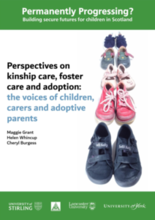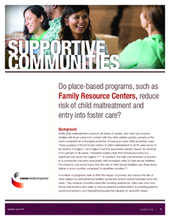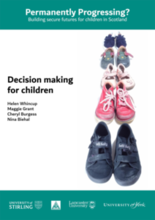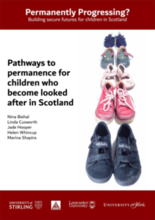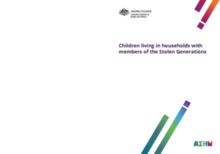Displaying 791 - 800 of 2221
This report has been completed as one part of the study Permanently Progressing? Building secure futures for children in Scotland which heard directly from children about their experiences.
This issue brief addresses the following questions: What are family resource centers? What are the defining characteristics of a family resource center? What do we know about the effectiveness of family resource centers in reducing child welfare involvement? What is the return on investment? What is missing from the research literature?
The Decision making for children report is one strand of the Permanently Progressing? study. In this strand, during 2015-17, 160 decision makers were interviewed across Scotland mainly in groups, but some individually.
This report presents the findings from strand one of the Permanently Progressing? study, Pathways to Permanence for children who become looked after in Scotland. This strand analysed data from the Children Looked After Statistics (CLAS) provided to the Scottish Government by all 32 local authorities on the total cohort of children who became looked after during the year 1 August 2012 - 31 July 2013 when they were aged five and under
This article reports on a study of the relationships between child protection system contact and small area-level deprivation in New Zealand. The study found that, compared to children living in the least deprived quintile of small areas, children in the most deprived quintile had, on average, 13 times the rate of substantiation, 18 times the rate of a family group conference, and 6 times their chance of placement in foster care. Findings suggest that action is needed to address the causes of deprivation, provide services that respond to families living in poverty, and undertake further research to examine the interactions between demand and supply of services across deprivation levels.
This study was aimed at assessing whether the Journey Up Mentorship Program in Salt Lake City improved outcomes for those aging out of foster care in the US state of Utah.
This study investigated foster parent (N = 792) perspectives about the legal representation of foster youth involved in dependency court proceedings in the US.
The aim of the presentation is to describe the personal features of non-kinship foster care children who have visits with their birth family in Málaga, Granada and Jaén (provinces of Andalusia, Spain).
The aim of the presentation is to describe the personal features of biological families whose children are in non-kinship foster care and with whom they have face-to-face contact in Málaga, Granada and Jaén (provinces of Andalusia, Spain).
This report presents analyses of selected outcomes for Aboriginal and Torres Strait Islander children who live in households with members of the Stolen Generations.

